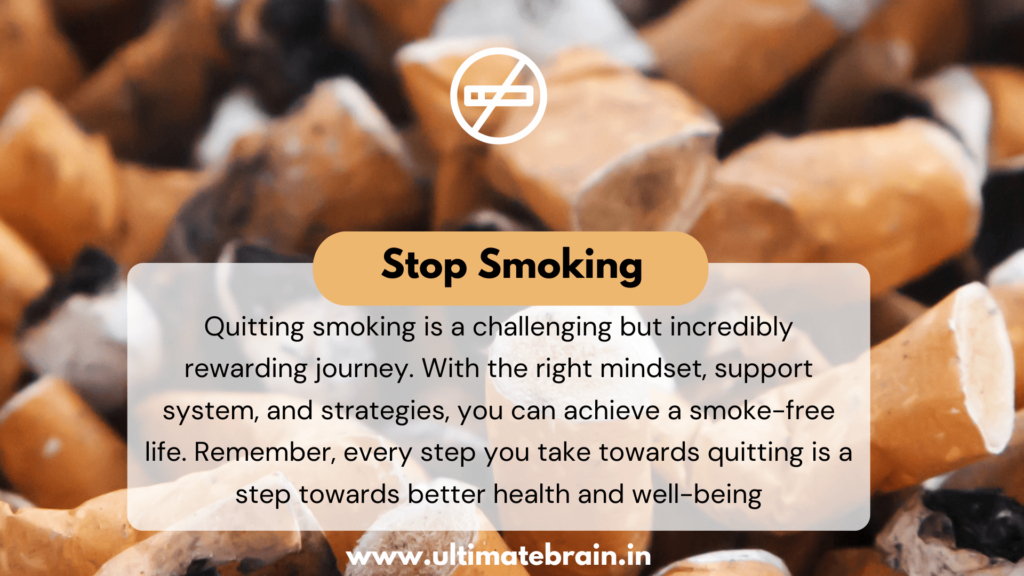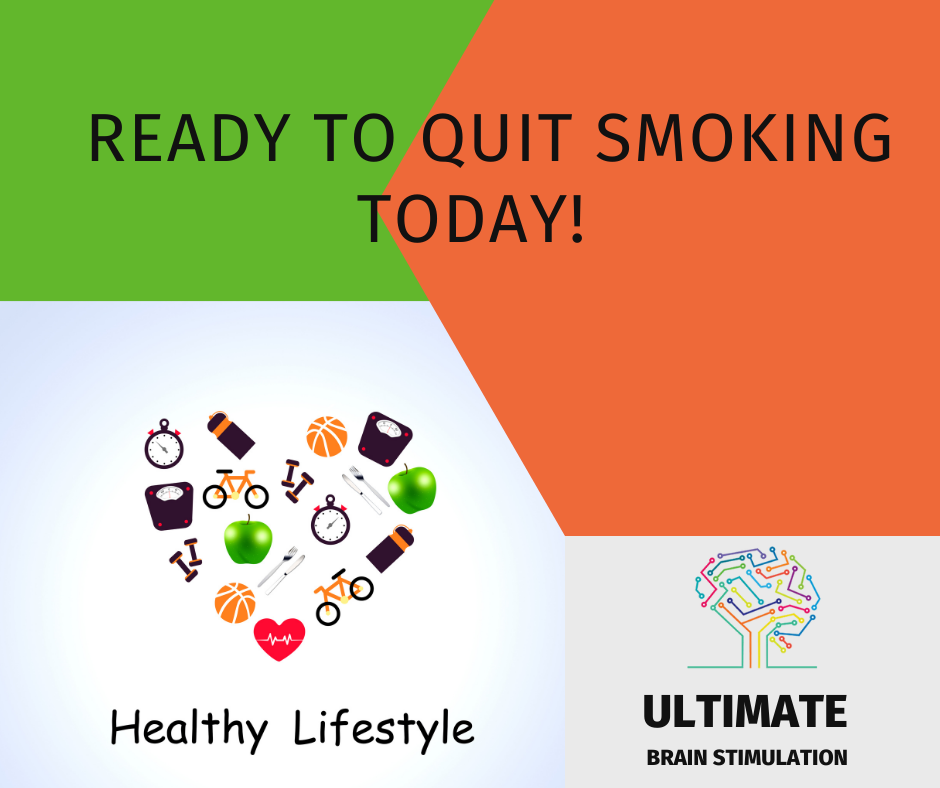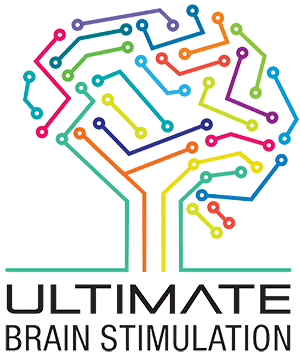Introduction
Welcome! I’m Dr. Murugappan, and I run the Ultimate Brain Stimulation Clinic in Chennai. Our mission is to help individuals lead healthier, smoke-free lives. Today, I want to share some advice on how to stop smoking, a decision that could be the best one you ever make for your health and well-being.

The Importance of Quitting Smoking
Health Risks
Smoking is one of the leading causes of preventable death worldwide. It contributes to a range of serious health issues, including lung cancer, heart disease, stroke, and chronic obstructive pulmonary disease (COPD). The harmful chemicals in cigarettes damage your lungs and cardiovascular system, leading to long-term health complications.
Benefits
Quitting smoking has immediate and long-term benefits. Within minutes of your last cigarette, your heart rate drops. Within a few weeks, your lung function improves. Over time, your risk of developing smoking-related diseases decreases significantly. Additionally, quitting smoking improves your sense of taste and smell, and you’ll find that you have more energy and better overall health.
Understanding Nicotine Addiction
How Nicotine Affects the Brain
Nicotine is a highly addictive substance found in cigarettes. It stimulates the release of dopamine, a neurotransmitter that makes you feel good. This creates a cycle of addiction, where your brain craves the dopamine hit that nicotine provides, leading to repeated smoking.
Psychological Aspects
Beyond physical dependence, smoking also involves psychological addiction. Many smokers associate smoking with certain activities, such as drinking coffee or taking breaks at work. These associations can make quitting even more challenging.
Preparing to Quit
Setting a Quit Date
Choosing a specific quit date can help you mentally prepare to stop smoking. Mark it on your calendar and let your friends and family know about your plan. This adds a layer of accountability and support.
Building a Support System
Having a support system is crucial when quitting smoking. Surround yourself with people who encourage your decision and can provide emotional support. This could be friends, family, or a support group.
Identifying Triggers
Recognize the situations or emotions that trigger your urge to smoke. Common triggers include stress, social situations, and certain routines. Once you identify these triggers, you can develop strategies to avoid or cope with them.
Quit Smoking Methods
Cold Turkey
Going “cold turkey” means quitting smoking abruptly without any aids. While some people succeed with this method, it can be challenging due to intense withdrawal symptoms.
Nicotine Replacement Therapy (NRT)
NRT provides a controlled dose of nicotine without the harmful chemicals found in cigarettes. Options include nicotine patches, gum, lozenges, and inhalers. NRT can help manage withdrawal symptoms and reduce cravings.
Prescription Medications
Certain medications, such as bupropion and varenicline, can help reduce cravings and withdrawal symptoms. Consult your doctor to see if these medications are right for you.
Behavioral Therapy
Behavioral therapy involves working with a counselor to develop strategies for quitting smoking. This can include cognitive-behavioral therapy (CBT), which helps you change your thinking patterns and behaviors related to smoking.
Alternative Therapies
Some people find success with alternative therapies such as acupuncture, hypnotherapy, or herbal remedies. While more research is needed, these options can be worth exploring.

Managing Withdrawal Symptoms
Common Symptoms
When you quit smoking, you may experience withdrawal symptoms such as irritability, anxiety, difficulty concentrating, and increased appetite. These symptoms are temporary and will diminish over time.
Tips to Cope with Cravings
Stay busy and engage in activities that distract you from cravings. Drink water, chew gum, and practice deep breathing exercises. Remember that cravings are usually short-lived and will pass.
Healthy Habits to Replace Smoking
Exercise and Physical Activity
Regular exercise can help reduce cravings and withdrawal symptoms. It also improves your mood and overall health. Consider activities like walking, running, or joining a gym.
Healthy Eating
Adopting a healthy diet can help manage weight gain that might occur when you quit smoking. Focus on fruits, vegetables, lean proteins, and whole grains. Avoid excessive snacking on unhealthy foods.
Mindfulness and Meditation
Practicing mindfulness and meditation can help you manage stress and cravings. Techniques such as deep breathing, progressive muscle relaxation, and visualization can be beneficial.
Dealing with Relapse
Understanding Relapse
Relapse is common when quitting smoking. It’s important to understand that a slip-up doesn’t mean failure. It’s a part of the process for many people.
Strategies to Get Back on Track
If you relapse, don’t be discouraged. Analyze what led to the relapse and develop a plan to avoid it in the future. Get back on track as soon as possible and continue working towards your goal.
The Role of Support Groups
Benefits
Support groups provide a sense of community and understanding. Sharing your experiences and hearing others’ stories can be incredibly motivating.
Finding the Right Group
Look for support groups in your area or online. Organizations like Nicotine Anonymous offer meetings and resources to help you quit smoking.
Long-term Strategies for Staying Smoke-Free
Maintaining a Healthy Lifestyle
Adopting a healthy lifestyle helps you stay smoke-free in the long term. Continue exercising, eating well, and practicing stress management techniques.
Regular Check-Ins with Your Doctor
Regular check-ins with your doctor can help monitor your progress and address any concerns. Your doctor can provide ongoing support and resources to help you stay smoke-free.
Success Stories
Real-Life Testimonials
Hearing success stories from others who have quit smoking can be inspiring. These stories provide hope and motivation, showing that it is possible to quit smoking for good.
Lessons Learned from Successful Quitters
Learn from the experiences of successful quitters. They often share valuable tips and strategies that worked for them, which can be helpful on your own journey.
Conclusion
Quitting smoking is a challenging but incredibly rewarding journey. With the right mindset, support system, and strategies, you can achieve a smoke-free life. Remember, every step you take towards quitting is a step towards better health and well-being.
FAQs
- What is the most effective way to quit smoking?
- The most effective way varies from person to person. Combining methods like NRT, prescription medications, and behavioral therapy often yields the best results.
- How long do withdrawal symptoms last after quitting smoking?
- Withdrawal symptoms typically peak within the first week and gradually diminish over the next few weeks.
- Can I use e-cigarettes to quit smoking?
- While some people use e-cigarettes as a quitting aid, they still contain nicotine and other harmful substances. It’s best to discuss with your doctor for personalized advice.
- What should I do if I relapse?
- Don’t be discouraged. Analyze the situation, learn from it, and recommit to quitting. Seek additional support if needed.
- How can I support a loved one who is trying to quit smoking?
- Offer encouragement, avoid triggering their cravings, and be patient. Joining them in their journey and celebrating their milestones can be very helpful.
Make an Appointment Today!
Call us at(+91)9444437698!
For more information, visit Ultimate Brain Stimulation Clinic.
Connect on LinkedIn
Watch on YouTube.
Contact us on WhatsApp.
For additional wellness services, check out Silkee.


Immediate chantix
October 1, 2024I’m impressed, I have to admit. Rarely do I encounter a blog that’s
equally educative and amusing, and let me tell you,
you’ve hit the nail on the head. The issue is
something that too few men and women are speaking intelligently about.
Now i’m very happy that I came across this during my hunt for something concerning this.
Immediate Chantix
January 9, 2025I am not sure where you are getting your info, but great
topic. I needs to spend some time learning more or understanding more.
Thanks for excellent information I was looking for this
information for my mission.
TokenTact
January 12, 2025Hello, i believe that i noticed you visited my blog thus i got here to go back
the prefer?.I am attempting to to find issues to improve my web site!I suppose its good enough
to make use of some of your ideas!!